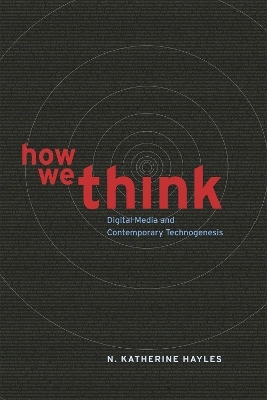
How We Think
Digital Media and Contemporary Technogenesis
Seiten
2012
University of Chicago Press (Verlag)
978-0-226-32142-4 (ISBN)
University of Chicago Press (Verlag)
978-0-226-32142-4 (ISBN)
How do we think? The author poses this question at the beginning of this bracing exploration of the idea that we think through, with, and alongside media. She examines the evolution of the field from the traditional humanities and how the digital humanities are changing academic scholarship, research, teaching, and publication.
How do we think? N. Katherine Hayles poses this question at the beginning of this bracing exploration of the idea that we think through, with, and alongside media. As the age of print passes and new technologies appear every day, this proposition has become far more complicated, particularly for the traditionally print-based disciplines in the humanities and qualitative social sciences. With a rift growing between digital scholarship and its print-based counterpart, Hayles argues for contemporary technogenesis-the belief that humans and technics are coevolving-and advocates for what she calls comparative media studies, a new approach to locating digital work within print traditions and vice versa. mines the evolution of the field from the traditional humanities and how the digital humanities are changing academic scholarship, research, teaching, and publication. She goes on to depict the neurological consequences of working in digital media, where skimming and scanning, or "hyper reading," and analysis through machine algorithms are forms of reading as valid as close reading once was.
Hayles contends that we must recognize all three types of reading and understand the limitations and possibilities of each. In addition to illustrating what a comparative media perspective entails, Hayles explores the technogenesis spiral in its full complexity. She considers the effects of early databases such as telegraph code books and confronts our changing perceptions of time and space in the digital age, illustrating this through three innovative digital productions - Steve Tomasula's electronic novel, "TOC"; Steven Hall's "The Raw Shark Texts"; and Mark Z. Danielewski's "Only Revolutions". Deepening our understanding of the extraordinary transformative powers digital technologies have placed in the hands of humanists, "How We Think" presents a cogent rationale for tackling the challenges facing the humanities today.
How do we think? N. Katherine Hayles poses this question at the beginning of this bracing exploration of the idea that we think through, with, and alongside media. As the age of print passes and new technologies appear every day, this proposition has become far more complicated, particularly for the traditionally print-based disciplines in the humanities and qualitative social sciences. With a rift growing between digital scholarship and its print-based counterpart, Hayles argues for contemporary technogenesis-the belief that humans and technics are coevolving-and advocates for what she calls comparative media studies, a new approach to locating digital work within print traditions and vice versa. mines the evolution of the field from the traditional humanities and how the digital humanities are changing academic scholarship, research, teaching, and publication. She goes on to depict the neurological consequences of working in digital media, where skimming and scanning, or "hyper reading," and analysis through machine algorithms are forms of reading as valid as close reading once was.
Hayles contends that we must recognize all three types of reading and understand the limitations and possibilities of each. In addition to illustrating what a comparative media perspective entails, Hayles explores the technogenesis spiral in its full complexity. She considers the effects of early databases such as telegraph code books and confronts our changing perceptions of time and space in the digital age, illustrating this through three innovative digital productions - Steve Tomasula's electronic novel, "TOC"; Steven Hall's "The Raw Shark Texts"; and Mark Z. Danielewski's "Only Revolutions". Deepening our understanding of the extraordinary transformative powers digital technologies have placed in the hands of humanists, "How We Think" presents a cogent rationale for tackling the challenges facing the humanities today.
N. Katherine Hayles is professor of literature at Duke University. Her books include How We Became Posthuman: Virtual Bodies in Cybernetics, Literature, and Informatics and Writing Machines.
| Erscheint lt. Verlag | 12.6.2012 |
|---|---|
| Sprache | englisch |
| Maße | 17 x 23 mm |
| Gewicht | 482 g |
| Themenwelt | Geschichte ► Teilgebiete der Geschichte ► Technikgeschichte |
| Geisteswissenschaften ► Sprach- / Literaturwissenschaft ► Anglistik / Amerikanistik | |
| Geisteswissenschaften ► Sprach- / Literaturwissenschaft ► Literaturwissenschaft | |
| Sozialwissenschaften ► Kommunikation / Medien ► Medienwissenschaft | |
| ISBN-10 | 0-226-32142-8 / 0226321428 |
| ISBN-13 | 978-0-226-32142-4 / 9780226321424 |
| Zustand | Neuware |
| Haben Sie eine Frage zum Produkt? |
Mehr entdecken
aus dem Bereich
aus dem Bereich
Buch | Softcover (2024)
Lehmanns Media (Verlag)
CHF 27,90
Digitalisierung neu denken für eine gerechte Gesellschaft
Buch | Hardcover (2023)
Quadriga (Verlag)
CHF 27,95
Vom Perceptron zum Deep Learning
Buch | Softcover (2022)
Springer Vieweg (Verlag)
CHF 27,95


